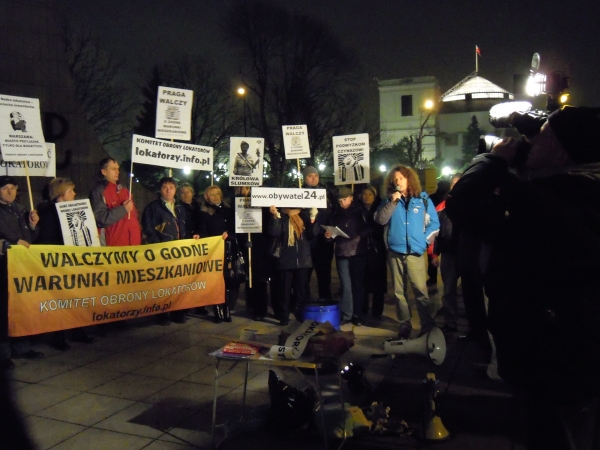Dodaj nową odpowiedź
Tenants Organize: A Grassroots Movement is Spreading around Poland (but still has a long way to go)
Akai47, Czw, 2009-12-10 20:36 English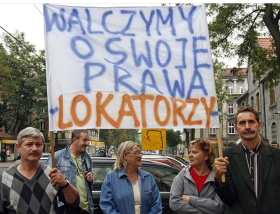 The following text was printed in Issue no.35 of Abolishing the Borders From Below.
The following text was printed in Issue no.35 of Abolishing the Borders From Below.
In recent months we have seen an increase in tenant protest and tenant-related activity across Poland. Although tenants' organizations have existed for years, this time things are a little different. Around the country, people are self-organizing, protesting and coordinating between the groups. The movement is still smaller than it should be, but for local reality, it is relatively big and noticeable. Why now? What happened that made the tenants organize and what are the problems that they face?
A little background on the situation will help people understand better.
HOUSING - A PROFITABLE COMMODITY
The housing situation has many local specifics; things can look quite different around Poland due to both historical reasons and the current socio-economic profile of the location. I will say a few things about the general situation and then more about the local situation but with the note that some of the problems of Warsaw exist in different proportions elsewhere.
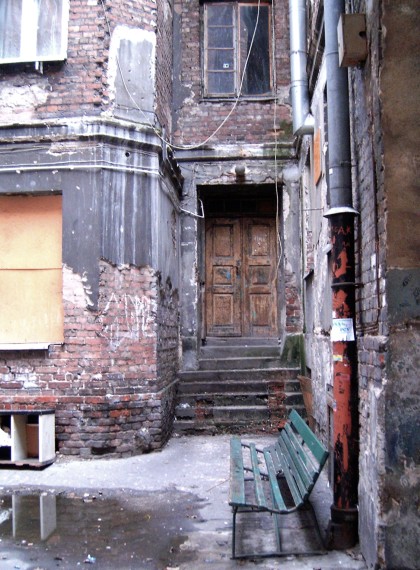 The biggest problem in general is that housing is a profitable commodity and people want to make money off it. During the PRL period, there was both private ownership and public, but there were very few private landlords. (They did exist though. More about that later.) In general, there was a housing shortage and long waits for people to get public housing. The extent of the shortage depended on the area, how many people wanted to live there, how much money was allocated to build there, and other historical factors... like the amount of destruction seen in WWII.
The biggest problem in general is that housing is a profitable commodity and people want to make money off it. During the PRL period, there was both private ownership and public, but there were very few private landlords. (They did exist though. More about that later.) In general, there was a housing shortage and long waits for people to get public housing. The extent of the shortage depended on the area, how many people wanted to live there, how much money was allocated to build there, and other historical factors... like the amount of destruction seen in WWII.
The PRL was not a classless society and, although some workers obtained decent housing, many also received substandard, slum-grade flats or houses. These houses, for many years, were not modernized or renovated. If you walk around neighbourhoods like Warsaw's Praga or similar poorer places throughout Poland, you can still see bullet holes all over the walls of the houses. You find lots of places with no toilets in the flats and no bathrooms. No heat. No gas. Wooden elements of the houses caving in. In short, many places were not modernized or renovated during the whole PRL period and they just began to fall apart. If people are able to live in some of these places at all, it is because they have fixed them up themselves. In a way, they make their places liveable in the same way as squatters all over the world - except they pay to live there.
After the PRL fell, there were many forms of privatization, and the profiteering that came with it. The cities and workplaces sold off many places at a cheap price... and people became private owners. But not everybody had the same opportunities to buy their places. First of all, whether or not you could buy depended on your financial situation - but not only. Different places offered different deals and many people were not allowed to buy at all. In the course of years, a class of propertied people sprung up while many people remained without. This class of propertied people now had access to a source of capital since they could sell or borrow against their property. But there were many left out of this privatization bonanza.
People who don't have a public housing agreement or people, for example children who grow up and want their own flat, faced a new situation. In the past, you would have to wait in line for a flat. Now, the ideology was turned so the idea of the capitalists and neoliberals who run things was to minimize the public sector, especially public housing, and expect everybody to satisfy their needs on the private market. So it started that people who could afford it, took loans for 30 years to buy something and landlords and property speculators started twisting the market and driving up prices. The end result is that housing became too expensive and is hardly affordable for anybody but a small elite. And for those who have to live somewhere but don't earn much, which is a good portion of the people, it is a constant struggle or life in cramped quarters. In general, the situation is bad for most people.
SOME WARSAW SPECIFICS
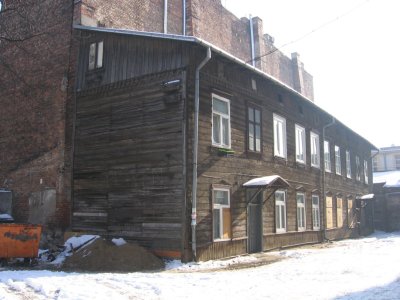 Some of the specific problems in Warsaw relate to both the extensive destruction of the city during WWII and its current status as financial capital of the country. As people probably know, most of Warsaw was destroyed by the Nazis. Part of the people who lived in Warsaw before the war were killed and part left the country. But after the war, the government wanted to rebuild the city and also repopulate it. People who had left the city during the war came back, but also new people would have to move here. But so much of the city's housing supply was destroyed.
Some of the specific problems in Warsaw relate to both the extensive destruction of the city during WWII and its current status as financial capital of the country. As people probably know, most of Warsaw was destroyed by the Nazis. Part of the people who lived in Warsaw before the war were killed and part left the country. But after the war, the government wanted to rebuild the city and also repopulate it. People who had left the city during the war came back, but also new people would have to move here. But so much of the city's housing supply was destroyed.
A few things happened. Private apartment buildings which weren't destroyed became city property and people were sent to live there. (There were some exceptions to this, but in general it was this way.) Also, many new buildings were built were old ones were destroyed.
This has its consequences today... because the city is "reprivatizing" these houses. Rarely does this mean giving it back to the original owners. Most of them are dead. Sometimes these houses go to grandchildren who never lived in Poland. Sometimes they go to speculators who bought the right to the claim. And sometimes they go to fraudsters who forged some documents.
All around the city, we see people who spent the last 40-50-60 years in a place, taking care of it, repairing it themselves, putting in water, heat, electricity, windows, etc. etc., who are suddenly told: this is not your house. And are told to leave. Or they are told: you should pay 50 times higher rent. And if they don't agree with this, then problems really start.
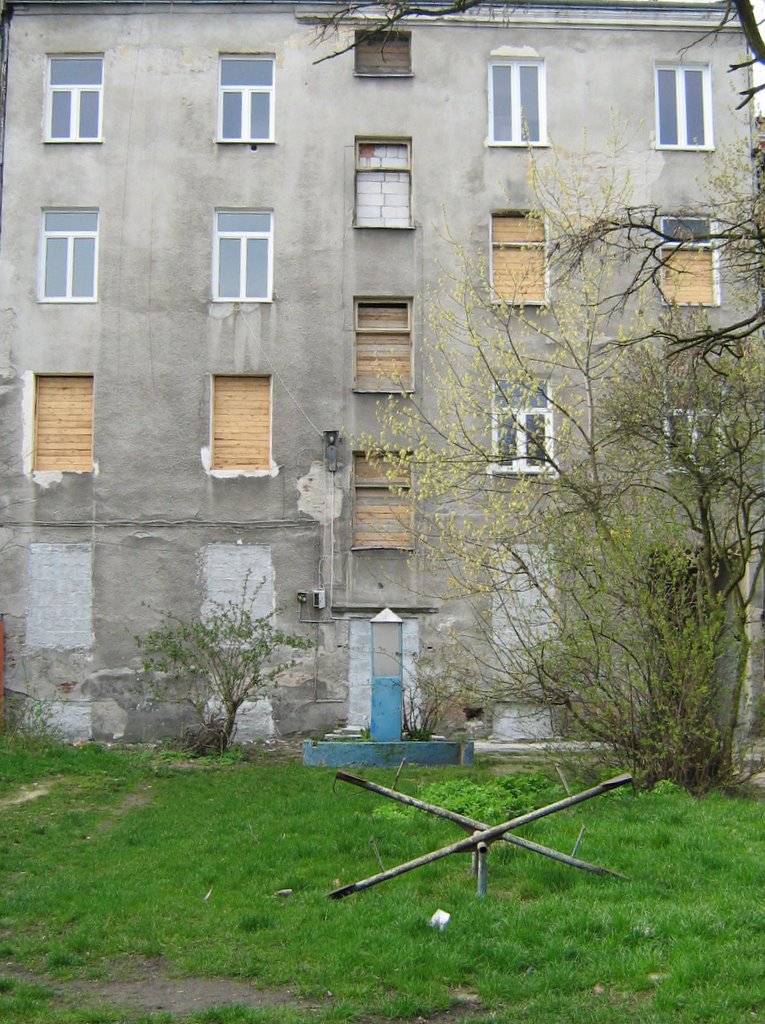
And the potential profit is huge because, despite the fact that many people in Poland cannot afford to buy anything, there is an elite in Warsaw which is, in terms of Poland, relatively large. In addition, there are foreign speculators and banks/ investment companies that built a lot of flats, many of which are empty. This pattern of property speculation exists in many other places in the world, so no need to go into details about how it works.
THE LAST STRAW(S)
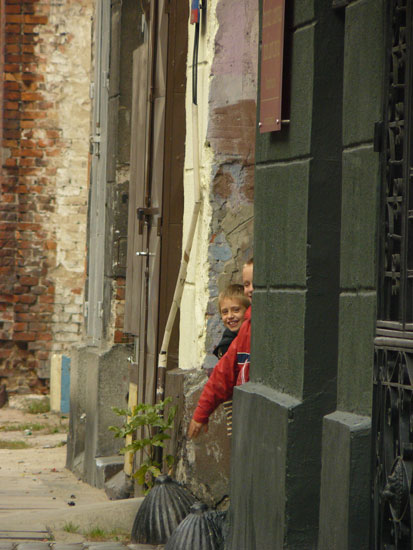 The tenants movement has been around for years, but a new wave of activity around Poland was inspired by a few things. First of all, for years, reprivatization was quite slow. But the current government, who are neoliberal ideologues of the worst sort, sped this process up. They also did other things, like raising rents 200-300% in many cities and cracking down on people in various ways.
The tenants movement has been around for years, but a new wave of activity around Poland was inspired by a few things. First of all, for years, reprivatization was quite slow. But the current government, who are neoliberal ideologues of the worst sort, sped this process up. They also did other things, like raising rents 200-300% in many cities and cracking down on people in various ways.
In April some neighbourhood people started the Tenants Defence Committee when they heard that the city wanted to raise rents and I and comrades from ZSP joined. Since then, we have met other groups of people who formed neighbourhood tenants associations, sometimes in one house or block, usually in response to things like a bad private landlord or the threat of reprivatization. And not only in Warsaw. People contact us from other cities saying they want to do the same. Or they just organize themselves. We can say that, although the scale of activity is not the same as in places with a longer history or a stronger civil society, these groups are definitely popping up like mushrooms around the country.
We can also see that, in some places, the situation became dire because people were losing work, but at the same time, where expected to pay much more money for housing, food and everything.
SOME CASES AND WHAT THE TENANTS GROUPS CAN DO
Part of what the different tenant groups do is protest and lobby. But there is also a lot of grassroots activism, helping people to help themselves and to organize for their self-defence.
The Tenants Defence Committee has open consultations twice a week and there are always people coming to ask for help, advice or to offer their help to the movement. In general, we try to help people avoid eviction, get more decent housing, get housing, not be mobbed or ripped off by landlords, fight corruption in the city, etc. etc. Everything is volunteer and depends on building a culture that people intervene when their neighbours are being fucked in some way. And there have been many individual success stories. Of course deeper systematic change is needed, but this is a good start. A lot of people are connecting, getting involved and overcoming the alienation and passivity common in society.
All of these cases are people who came to the Committee for help or who joined:
- A. is a mother of two young school-age boys who lives with her boyfriend and children in a 12 meter flat. She dreams about getting a bigger flat because all four people hardly fit in one room and the kids tend to get on each others' nerves and fight instead of study. She is afraid that this will negatively affect the family situation and the children't development. She has tried for years to get a larger flat, but there are thousands of people ahead of her on the list. She cannot afford to rent a place, although she is weighing the option of getting a second job and what would be worse: never seeing the kids, or living in the small flat. She is also afraid that, despite the fact it's not her fault, the social services may decide that her housing is not suitable for her family and take away her kids. (We can read about such cases in the newspapers from time to time.)
- B. lived in a flat owned by her workplace, a city entity. When they got money to gentrify the building, the workplace, ignoring the law, moved people into alternative housing of a much worse standard. People were put under pressure since they felt their jobs were also threatened. B. was offered a 7 meter basement outside of Warsaw in exchange for her 70 meter flat. When she refused to go, they cut off her heat, hot water and removed the plumbing. Finally they tried to evict her. The eviction papers indicated her "new address" - a building that didn't exist. The eviction was blocked and she got a better flat, although not as good as the old one.
- C. lived in attractive real estate that "had a fire". In accordance with the law, people moved out to repair houses should get temporary housing and be moved back. All the people in her house never returned and the flats were renovated and sold to yuppies. For years, she and her 3 sons, all of whom are grown, lived in a 28 meter flat with extremely bad conditions. She has been trying for years to get a better flat.
- D. has two children but, when things didn't work out with her partner because of abuse, she returned home and lived in one room with 4 other people. There was alcoholism and violence. She left her partner because of it, but found it again in her family home - a familar cycle. She was determined to get away from this violence and was able to leave temporarily and live in rented accomodations, even though this was very difficult for her. When somebody in her family died, and being unable to afford her own flat, she wanted to go back to the apartment, move out the other people to another place and take over the flat. But the city said she has no legal title. She also admitted that she lived outside this house sometime, so the city claimed she could afford her own place. When the city determines you have no legal right to a flat you are living in, they impose fines. Still living there then with 3 other people, the family could not afford the fines and an eviction order was given.
- E. lives in a house that is falling apart. Literally. Water leaks when it rains, there is fungus all over, no heat, etc. The city wants to move his family to another, much worse flat, but don't want to guarantee their return after repairs are made.
- F. lives in a reprivatized house. Nobody knows how the owner became the owner since there are old people in the house who remember the owners before the war. The city is not cooperative in giving them, or any people in their situation, information. When they asked who the owner was, they were told it is "personal data" that cannot be disclosed. When they found out anyway and asked how this person became the owner, they were told that this is the business of the two parties involved (the city and the owner) and that the tenants are "not parties to the case". Although decisions on such matter are legally public, the city does everything to block access to documents. After lots of work getting information on the owner, the number of the decision, etc. etc., the city claims it cannot find a copy of the decision. In the meanwhile, it has come to our attention that the owner was involved in acquiring other properties under rather corrupt circumstances. The tenants are currently fighting with the landlord who cut off their gas and water.
- G. was always told that she lived in one of the few buildings which was reprivatized years ago and was private even during the PRL era. For years she paid the private slumlord and received dodgy receipts. The conditions are quite bad. At some point she began to doubt whether the landlord really had legal title, but also she was not able to get information. After our very interesting intervention, she finally found out about the building - which is owned by the city. The details of this story are still being worked out, but it looks as if somebody in the administration made a "deal" with someone not to enter the real estate on the lists of municipal property and probably the "landlord" and some corrupt bureaucrats have been splitting the rent money for years.
It is often the case that the city does not have complete lists of its property, for various reasons, including corruption. Paper records, to which there was extremely limited access, were easy to manipulate or make disappear.
These cases, which are only a select few, reflect some of the problems people face. What are people doing to combat this?
First of all, knowing that it is possible to fight is the first step. Many poor people have weak social networks in Poland and little experience with fighting for their rights. The law is byzantine at times, and the bureaucracy can act above the law, especially if it was involved in wrongdoing.
Part of the problem is to document all these stories and to show the patterns. The city tries to sweep these problems under the carpet, or make things to be the fault of "bad people" who can't manage their own finances or affairs. It is also important to expose when city officials have broken the law.
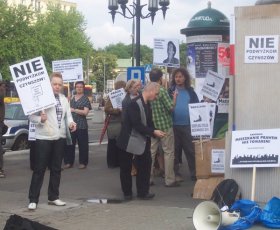 Another important thing is to motivate people to take direct action. Direct action means blocking evictions, or standing up for neighbours when their landlord turns off the gas. But first people have to know about it and believe that their presence in a confrontation can make a difference. Another form of direct action is simply squatting. Or organizing a rent strike. The latter is something we called for but the movement was not ready for yet.
Another important thing is to motivate people to take direct action. Direct action means blocking evictions, or standing up for neighbours when their landlord turns off the gas. But first people have to know about it and believe that their presence in a confrontation can make a difference. Another form of direct action is simply squatting. Or organizing a rent strike. The latter is something we called for but the movement was not ready for yet.
Other forms of action have included protests and confrontations with politicians. For example busting into the office of the Vice President and confronting him about misleading people on actual housing policy.
Here I only gave examples from Warsaw because I know these cases first hand. But tenants are acting in different cities. In Bialystok tenants interrupted the city council and are suing the city. In Krakow, tenants hold regular meetings and block some evictions. In other cities, people are forming groups to give legal advice or help people avoid eviction.
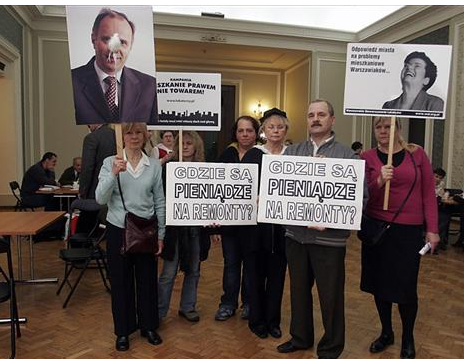 There is still a lot to do. There are only a couple of hundred people really involved around the country, which is still small for a problem of this size. But it is a start and something which has given hope to some people who are in dire circumstances and decided to fight. We are hoping this fight will continue and grow.
There is still a lot to do. There are only a couple of hundred people really involved around the country, which is still small for a problem of this size. But it is a start and something which has given hope to some people who are in dire circumstances and decided to fight. We are hoping this fight will continue and grow.
Akai
